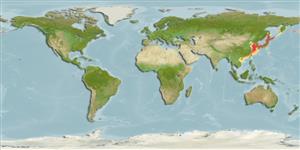Common names from other countries
>
Perciformes/Zoarcoidei (Eelpouts and pricklebacks) >
Stichaeidae (Pricklebacks) > Stichaeinae
Etymology: Ernogrammus: Greek, ernos, -eos, -ous = bud, shoot, descendenat + Greek, gramma = letter, mark, signal (Ref. 45335).
More on author: Schlegel.
Environment: milieu / climate zone / depth range / distribution range
पारिस्थितिकी
समुद्री ड़िमरसल; गहराई सीमा 0 - 142 m (Ref. 50610). Temperate
Northwest Pacific: Japan to the Gulf of Po-Hai (Gulf of Chihli), the Sea of Japan, and the southern Kuril Islands.
आकार / वज़न / Age
Maturity: Lm ? range ? - ? cm
Max length : 15.0 cm SL पुल्लिंग / अलिंग; (Ref. 559)
Inhabit coastal, near rocky reefs among algae and rocks; also brackish waters (Ref. 51666). This nocturnal fish hide between stones during the day and move to sandy areas in the evening for foraging. Feeds mainly on polychaetes and mysids, decapod crustaceans, fishes, algae and sipunculans. A solitary species with low level of contacts and aggression. Potential predators include Squalus acanthias, Sebastes taczanowskii, and S. trivittatus, sea scorpions Myoxocephalus, and cormorants (Ref. 86742). Oviparous, eggs are guarded by the male (Ref. 58332).
Life cycle and mating behavior
परिपक्व अवधि | पुनरुत्पत्ति | मछलीऔ का अंडे देना | अंडे | Fecundity | लार्वा
Masuda, H., K. Amaoka, C. Araga, T. Uyeno and T. Yoshino, 1984. The fishes of the Japanese Archipelago. Vol. 1. Tokai University Press, Tokyo, Japan. 437 p. (text). (Ref. 559)
IUCN Red List Status (Ref. 130435)
CITES (Ref. 128078)
Not Evaluated
Threat to humans
Harmless
Human uses
अधिक जानकारी
आम नामउपशब्दचपायचयपरभक्षीईकोटोकसीकोलौजीपुनरुत्पत्तिपरिपक्व अवधिमछलीऔ का अंडे देनाFecundityअंडेEgg development
संदर्भजलीयकृषिजलीयकृषि रूपरेखाखींचआनुवंशिकीElectrophoresesहैरेटिबिलटीबीमारीप्रक्रमणMass conversion
सहयोगीयोतस्वीरेStamps, Coins Misc.ध्वनिसिगुयटिरारफ्तारतैरने के प्रकारगिल क्षेत्रOtolithsदिमागदृष्टि
साधन
Special reports
Download XML
इंटरनेट स्रोत
Estimates based on models
Preferred temperature (Ref.
115969): 3.8 - 20.6, mean 15.4 (based on 196 cells).
Phylogenetic diversity index (Ref.
82804): PD
50 = 0.6250 [Uniqueness, from 0.5 = low to 2.0 = high].
Bayesian length-weight: a=0.00447 (0.00228 - 0.00875), b=3.12 (2.94 - 3.30), in cm Total Length, based on LWR estimates for this species & (Sub)family-body (Ref.
93245).
Trophic level (Ref.
69278): 3.3 ±0.5 se; based on size and trophs of closest relatives
लौटाव (Ref.
120179): माध्यम, न्यूनतम जनसंख्या दुगनी होने का समय 1.4 - 4.4 वर्ष। (Preliminary K or Fecundity.).
Fishing Vulnerability (Ref.
59153): Low vulnerability (10 of 100).
